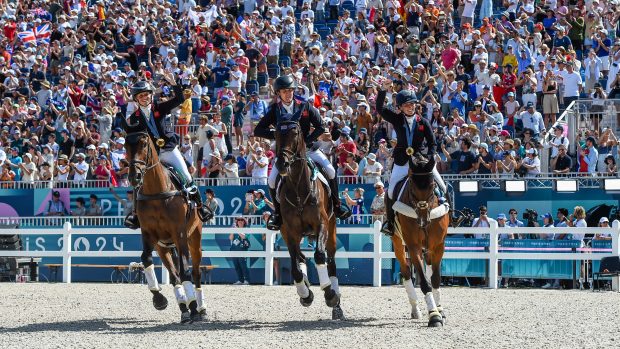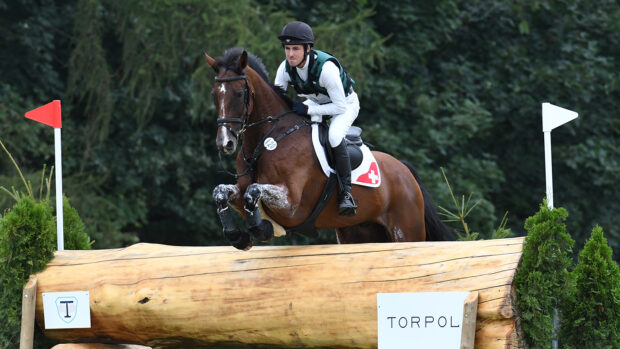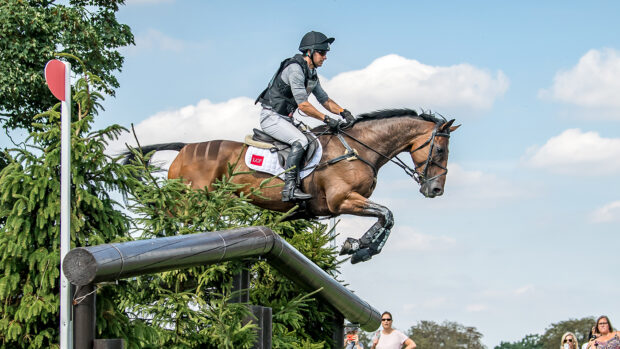Eventing World Champion Blyth Tait answers our users’ questions
When Horse & Hound Online invited users to submit an eventing question for World Champion Blyth Tait, there was a great response.
Barbara Edmonds from Oxon, was chosen as the winner of a fantastic Toggi Maverick two-in-one jacket, Toggi Ashford twill shirt and Champion Universal riding hat.
Ten runners-up each receive a copy of Blyth’s new book, “Six of the best: Tait’s top horses”.
The winning question
Barbara asked:
“If Ready Teddy was a character in a TV soap who would he be and why?”
Blyth replies: Ready Teddy would be an all-time great person with superstar qualities. He is self-assured without being at all condescending. All the other horses love and respect him, and he is fun to know.
He would probably be a comedy character – maybe the best qualities of all three guys from “Friends” rolled into one!
The 10 runner-up questions
Click here to read Blyth’s answer
Click here to read Blyth’s answer
Click here to read Blyth’s answer
Click here to read Blyth’s answer
Click here to read Blyth’s answer
Click here to read Blyth’s answer
Click here to read Blyth’s answer
Click here to read Blyth’s answer
Click here to read Blyth’s answer
Click here to read Blyth’s answer
If you could change any rule in eventing which would it be and why?
Lisa Willey, Essex
Blyth replies: I would introduce dressage judges from the pure dressage discipline at CCIs. I believe that the level of professionalism in the riders, course- designers, technical delegates, organisers, vets etc has continued to progress while the dressage judging has not.
We do have some very good judges, but not enough. I don’t believe it is sufficient for judges to only judge half a dozen three-day events a year ? and do nothing else.
They should be judging regularly, attending seminars, training horses or, at the very least, watching top trainers at work or even riding themselves.
They must be totally aware of the overall complexities of dressage and not just mark on accuracy and obvious mistakes. Anyone can do that.
Nowadays there are very few people who have the knowledge to judge dressage as well as understand cross-country and show jumping design, veterinary procedures and so on, at the very highest level.
Perhaps they should be a specialist of one subject or discipline instead of an “all-rounder”.
Other than your own horses, what other horse past or present would you most like to ride and why?
Carol Grant, Essex
Blyth replies: All the very athletic, smaller Thoroughbred types – Get Smart and Too Smart for example. Also, the lovely American horses such as Out And About andJacob Two Two.
I don’t know whether some of the horses who have been very successful with other riders would necessarily have been that successful with me, as I would have to like their personality and fit well with them.
I can’t dominate horses and prefer to utilise their own athleticism. Heidi Antikatzidis’ Michaelmas is another horse that looks like he would be fun.
What qualities do you think an event horse needs to make it to the top?
India Thomson, Suffolk
Blyth replies: They need to be athletic, sound and – probably the most important of all – they have to really want to please the rider, have a genuine attitude and a willingness to gallop and jump. You can only persuade them so far.
How do you keep your horses in top condition?
Helen Ponting, Bristol
Blyth replies: By paying attention to detail. Good feeding, good fitness and extra good care. I like my horses to enjoy life and have the most natural lifestyle possible. They go into the field every day to relax and graze or, if they prefer, to roll or gallop about. It’s their choice!
Is there one fence that really stands out in your eventing experience as the “rider frightener” of all time, and why was it so?
Joanna Dakin, Cheshire
Blyth replies: The Centaur’s Leap at Burghley was always incredibly awe-inspiring, but has been made less so since becoming the Cottesmore Leap with a take-off board and reduced width.
With experience, the fences begin to look less terrifying size-wise! I remember a road crossing in the woods at the Stockholm World Championships 1990 looked pretty daunting with a downhill approach and abig drop off, but it in fact rode well.
What is the best advice you can give someone just beginning to event and what was the best advice you were ever given?
Verity Perrott, Somerset
Blyth replies: Be dedicated and determined. Nowadays, talent alone is not enough to enable you to get to the top. You will need to work hard as well to succeed, as has been the case with all the leading riders today without exception.
The best bit of adviceI’ve ever been given was “Don’t let self doubts override confidence in yourself.”
Do you wear anything lucky when you compete?
Tammy Thornton, Wilts
Blyth replies: I used to, but I seem to exhaust all their magical powers! After you have fallen off and broken your leg wearing your lucky socks, you begin to wonder what you have to be thankful for.
One thing I still can’t stop myself from doing – even now – is putting my left boot on first before the jumping phases and my right boot on first for the dressage. However, at an ODE I put the left boot on first because I view the jumping as more important! Plus, as my father tells me you make your own luck!
Any tips for dealing with pre-event nerves?
Claire Whitaker, Essex
Blyth replies: Remain positive. I can talk myself into winning – or just as easily out of it!
It’s normal to get nervous and you are not alone in doing so, but youshould use the nervous energy to your advantage. Don’t worry about thingsthat you can not control, but instead focus on what you can!
Walking the course, checking your gear etc. Keep things in perspective, chat toothers if you want or read a book or what ever, but be sure to enjoy yourselfor the effort that you’ve put in at home won’t be worth it.
What is your favourite meal (cooked in the lorry) when staying away from home at competitions?
CA Robertson, Auchterarder
Blyth replies: I’m hopeless with food – both cooking and eating. It doesn’t excite me and I have no appetite. I enjoy simple dishes such as pasta, salads, steak etc.Therefore, in the lorry, I am as happy as Larry with whatever can be knockedup from the meagre ingredients that we usually have.
Now wine and alcohol – that’s a different story altogether! Try New Zealand?s “Cloudy Bay” if you haven’t already!!
What fittening programme do you have when bringing a horse back into work following injury?
Megan Williams, Kent
Blyth replies: It depends on the horse and injury, but as a rule I ensure that I allow plenty of time, as well as being very gradual and consistent in building up the workload.
If you take the time to lay a good foundation of fitness at the beginning, you will reap the rewards later. Keep an eye out for warning signs from the horse and don’t increase the work until you are sure that the horse is coping well.



